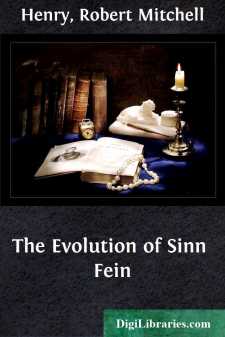Categories
- Antiques & Collectibles 13
- Architecture 36
- Art 48
- Bibles 22
- Biography & Autobiography 813
- Body, Mind & Spirit 142
- Business & Economics 28
- Children's Books 17
- Children's Fiction 14
- Computers 4
- Cooking 94
- Crafts & Hobbies 4
- Drama 346
- Education 46
- Family & Relationships 57
- Fiction 11829
- Games 19
- Gardening 17
- Health & Fitness 34
- History 1377
- House & Home 1
- Humor 147
- Juvenile Fiction 1873
- Juvenile Nonfiction 202
- Language Arts & Disciplines 88
- Law 16
- Literary Collections 686
- Literary Criticism 179
- Mathematics 13
- Medical 41
- Music 40
- Nature 179
- Non-Classifiable 1768
- Performing Arts 7
- Periodicals 1453
- Philosophy 64
- Photography 2
- Poetry 896
- Political Science 203
- Psychology 42
- Reference 154
- Religion 513
- Science 126
- Self-Help 84
- Social Science 81
- Sports & Recreation 34
- Study Aids 3
- Technology & Engineering 59
- Transportation 23
- Travel 463
- True Crime 29
The Evolution of Sinn Fein
Description:
Excerpt
INTRODUCTORY.
It is almost a commonplace of the political moralists that every failure on the part of England to satisfy the moderate and constitutional demands of the Irish people for reform has been followed invariably by a deplorable outbreak of âextremistâ activities in Ireland. Unfortunately for the moral, that constitutional demands should therefore be promptly and fully conceded, the statement is almost exactly the reverse of the truth, if Irish history as a whole be taken as the field for induction. The Irish Nation cannot be said to have at any period abandoned its claim to independence. Of the meaning of that claim there was no question from the Conquest to the fall of Limerick. The whole of that period is occupied by a long struggle between the English and the Irish peoples for the effective possession of the island. On neither side was there any misapprehension of the meaning and object of the contest. The English Government, whether it employed naked force, intrigue or legal fiction, aimed (and was understood to aim) at the moral, material and political subjugation of the Irish: the Irish, whether they fought in the field or intrigued in the cabinets of Europe, whether allied with France or with Spain or English royalists, had but one object, the assertion of their national independence. It was a struggle not merely between two nations but between two civilizations. Men of English blood who were absorbed by the Irish nation and who accepted the Irish civilization fought as stoutly for the independence of their adopted (and adopting) country as did the descendants of the Milesians. England could never count on the fidelity to her ideals and policy in Ireland of the second generation of her own settlers. History cannot produce another instance of a struggle so prolonged and so pertinacious. Whole counties, stripped by fire and sword of their aboriginal owners were repeopled within two or three generations and renewed the struggle. But superior numbers and organization, a more fortunate star and (it seemed) the designs of Providence, prevailed in the end; and with the fall of Limerick England might have regarded her task as at last accomplished. The Irish Nation was prostrate, and chains were forged for it which, heavier and more galling than any forged for any nation before, seemed to offer a perpetual guarantee of slavery, misery and degradation. Ireland was henceforth to be administered as a kind of convict settlement. The law, in the words of a famous judgment, did not presume the existence of such a person as a Catholic Irishman; that is to say, two-thirds of the inhabitants of the country had no legal existence. Legal existence was the privilege of Protestant Englishmen living in Ireland and of such Protestant Irishmen as claimed it. But legal existence in Ireland during the eighteenth century was no prize to be grasped at. The mere fact of residence in Ireland entailed practical disabilities for which no mere local ascendancy was an adequate compensation....


